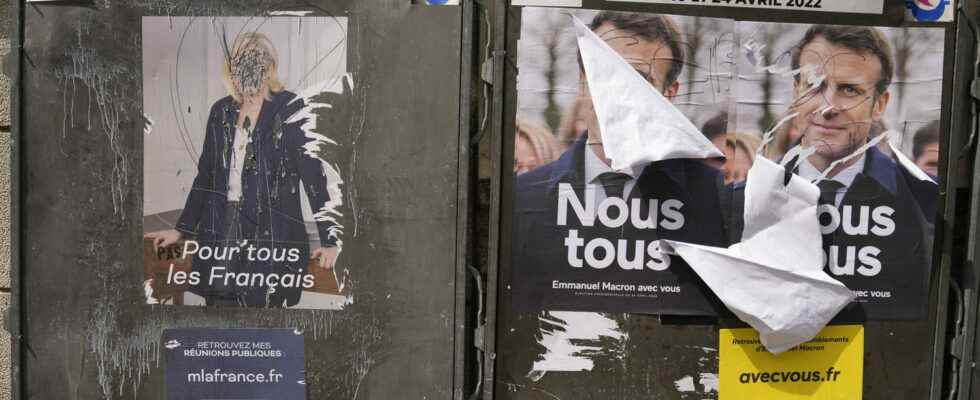RADIO LONDON. On this day of the 2nd round of the 2022 presidential election, the coded messages of “Radio London” are back on social networks, especially Twitter. Can they give the result in advance?
Presidential results near you
[Mis à jour le 24 avril 2022 à 18h46] Here is a little game that Internet users are passionate about, election after election: find out the result of the second round of the 2022 presidential election before 8 p.m. and comment on it on social networks. For several years, the practice has become widespread through an expression and a hashtag on Twitter: “#RadioLondres”. Many Internet users, in a hurry to know the outcome of a ballot which nevertheless seems far from undecided in view of the polls, are still taking part in it this Sunday, April 24, 2022. Throughout the day this Sunday, April 24, on the networks social, each message related to the vote is scrutinized.
Among the plethora of publications, especially on Twitter, some sometimes have enigmatic, colorful, even difficult to understand turns of phrase. These are the posts often accompanied by the mention “#RadioLondres”. The development of social networks in the presidential campaign over the last decade or so has brought up to date the story of the real Radio London, this process of coded messages sent via the BBC from London to organize the Resistance in France during the Second World War. In the context of the presidential election, these are in no way texts linked to the war but rather writings aimed at giving the trend of the results of the national election.
Before 8 p.m. and the official publication of the first estimates giving a first partial result of the presidential election, Internet users do not hesitate to write messages, mainly on Twitter, ensuring to disseminate a trend on the outcome of the ballot. Coded messages to avoid falling under the law which prohibits any publication of figures in France before 8 p.m. Otherwise, a fine of 75,000 euros may be imposed on the perpetrator. Cunning is therefore in order with the search for metaphors, when reliability leaves something to be desired.
Where do the results announced by Radio London come from?
This is indeed the limit of the hashtag #RadioLondres on Twitter: the origin of the advanced elements. Three scenarios are to be kept in mind when reading a message of this type: first, the most frequent unfortunately, that of a publication devoid of any source, corresponding to eccentric allegations straight out of the imagination (or hope!) of its author, with a view to trying to influence the last voters despite the very limited scope of the exercise; the second, which occurs sometimes but quite rarely, is that of a feedback from one or more polling stations from the first counts; the third, which arrives at the end of the afternoon, is that of coded messages written from estimates published by foreign media, such as La Libre in Belgium, RTBF or the Tribune de Genève in Switzerland. Their figures are then included, without expressly naming the candidates. But reading these messages does not presage, the vast majority of the time, anything about the final result.
Reduced reliability over time for Radio London
If in the past, these “coded” messages from Radio London were not particularly reliable, they are even less so with the later closing of the polling stations. Indeed, since the presidential election of 2017, the votes close from 7 p.m. However, until then, some of the voting booths installed in France were no longer accessible from 6 p.m. Thus, the lapse of time between the first counts and the lifting of the embargo on the figures was more consequent and made it possible to collect more partial results. However, with the closing of the votes an hour later, it is as much less latency time, making it possible to limit “leaks”, especially since the counting process is long and very formal. At best, the first figures put together could make it possible to obtain estimates about ten minutes before the official timetable.
Radio London hijacked by activists?
Especially since Radio London was diverted from its initial function when it appeared on social networks. If, initially, their aim was to highlight the polls or announce true-false results in a humorous way, the messages have recently taken a completely different turn. Indeed, activists from various political camps do not hesitate to multiply posts favorable to their colt in an attempt to influence the vote of voters who have not decided or who have not yet gone to the polls. And this, while the scope is still limited, Twitter being absolutely not representative of French opinion. During the 1st round of the 2022 presidential election, supporters of Eric Zemmour did not hesitate to publish tweets praising the qualification of their champion in the 2nd round, he who claimed it the previous days. Race results: he finished 4th by less than 10%.
How are Radio London hype messages written?
On the day of an election, which is moreover presidential, users are full of ingenuity to evoke “trends coming out of the polls” (read above), while waiting for the first official estimates at 8 p.m. The sibylline messages of Radio London are written through metaphors making it possible to identify, despite everything, the candidates, without too much difficulty. From puns related to the family name (in the first round, Zemmour was associated with the olive tree, “Zemmour” being the name of the tree in Berber; Netherlands for Holland in 2012), to characteristics (in 2017, Macron was nicknamed “the kid”, then “Jupiter” in 2022; heels were used for Sarkozy). Internet users are not lacking in imagination when it comes to finding metaphors. It remains to know how to decode them.
